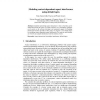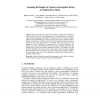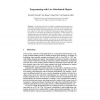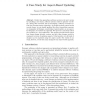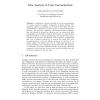ECOOP
2008
Springer
15 years 3 months ago
2008
Springer
It is very hard to fix a software failure without being able to reproduce it. However, reproducing a failure is often difficult and time-consuming. This paper proposes a novel tech...
106
click to vote
ECOOP
2008
Springer
15 years 3 months ago
2008
Springer
Explicitly representing aspect interactions is vital so that they can be shared and used in the course of system evolution. As a consequence, guidance can be given to the software ...
109
click to vote
ECOOP
2008
Springer
15 years 3 months ago
2008
Springer
The adapter design pattern [1], commonly used for integration and evolution in component-based systems, is originally described by roles. In classbased systems, the conventional re...
121
click to vote
ECOOP
2008
Springer
15 years 3 months ago
2008
Springer
Exception handling mechanisms are intended to support the development of robust software. However, the implementation of such mechanisms with aspectoriented (AO) programming might ...
126
click to vote
ECOOP
2008
Springer
15 years 3 months ago
2008
Springer
A component revolution is underway, bringing developers improved productivity and opportunities for code reuse. However, whereas existing tools work well for builders of desktop ap...
111
click to vote
ECOOP
2008
Springer
15 years 3 months ago
2008
Springer
This paper demonstrates the impact of integrating session types and object-oriented programming, through their implementation in Java. Seses provide high-level abstraction for stru...
114
click to vote
ECOOP
2008
Springer
15 years 3 months ago
2008
Springer
This paper describes Kilim, a framework that employs a combination of techniques to help create robust, massively concurrent systems in mainstream languages such as Java: (i) ultra...
104
click to vote
ECOOP
2008
Springer
15 years 3 months ago
2008
Springer
Rather than upgrading a software system to the next version by installing a new binary, software systems could be updated "on-thefly" during their execution. We are devel...
105
click to vote
ECOOP
2008
Springer
15 years 3 months ago
2008
Springer
Inconsistency between metadata and code customizations is a major concern in modern, configurable enterprise systems. The increasing reliance on metadata, in the form of XML files,...
105
click to vote
ECOOP
2008
Springer
15 years 3 months ago
2008
Springer
Domain specific aspect languages (DSALs) are becoming more popular because they can be designed to represent recurring concerns in a way that is optimized for a specific domain. H...

